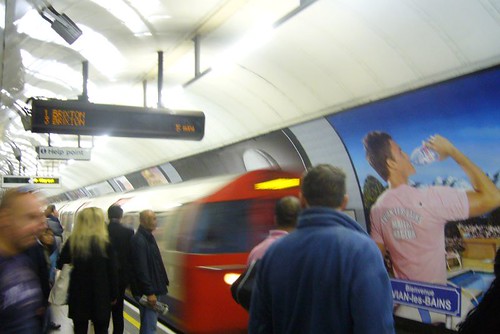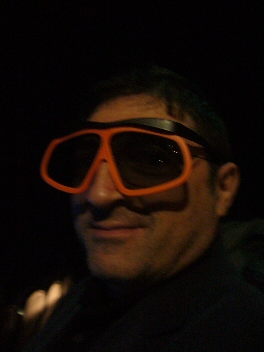Transport for London clearly uses a very different sort of dictionary to the rest of us. Take, for example, its use of the word 'planned', as in 'Planned engineering works'. This is the term used to justify and explain the fact that public transport, by tube at least, becomes an endurance, intelligence and orienteering test worthy of the Duke of Edinburgh Award at the weekends.
 A photo of a train in serviceTake this weekend, for example. What should have been a simple and straightforward journey home after the BETT Show turned out to be a task akin to one of Hercules' Labours. My plan was to get on the Circle Line at Gloucester Road, sit there and cogitate, meditate or sleep until I arrived at Liverpool Street, and then take the National Express train home.
A photo of a train in serviceTake this weekend, for example. What should have been a simple and straightforward journey home after the BETT Show turned out to be a task akin to one of Hercules' Labours. My plan was to get on the Circle Line at Gloucester Road, sit there and cogitate, meditate or sleep until I arrived at Liverpool Street, and then take the National Express train home.
Unfortunately, TfL had other ideas.
Because of so-called 'planned engineering works', the Circle Line was completely suspended, the District Line was also suspended, no Piccadilly Line trains were stopping at Kings Cross, and even if they had been it would have made no difference because the Hammersmith and City Line was partially suspended.
The result was that, after spending a bit of time deciding which of the possible routes home was the least arduous, I spent the next two hours on a long, circuitous journey, standing virtually all the way.
Before I get on to the bit that relates to the title of this article, let me just say something about this 'planning'. To use an Americanism (which I don't often do but in this case the expression fits), it sucks. Any 15 year old with a rudimentary knowledge of Excel could devise a better plan that this. How come other countries are able to upgrade their metro systems without all the disruption that we Londoners have to suffer, every single weekend?
But this time TfL surpassed itself.
This was the weekend in which the BETT Show finished.
The BETT Show is the biggest show of its kind in Britain.
The BETT Show is the biggest show of its kind in the world.
This year the BETT Show had 700 exhibitors and attracted 30,000 visitors.
Surely someone at TfL might have looked at a calendar of events and thought that perhaps Saturday 16th January 2010 was not a great time to suspend half of the tube?
When I was project managing a major school refurbishment, which at one stage involved closing one of the entrances, I consulted with all the stakeholders I could think of -- even including local residents who would be affected by all the kids going past their houses because their usual route to school would no longer be any good.
As it happens, I upset the patrons of the local church, because nobody had thought to tell me that they used that school entrance every Sunday in order to park their cars in the playground. But that only goes to illustrate the importance of consulting with as many people as possible before taking major actions.
Anyway, here we have possibly 30,000 people rattling around trying to find their way home or to the airport or to their hotels, and someone announces that, apart from the fact that half the network doesn't work (making it a 'notwork'), there is a good service.
A good service!!
That's like a teacher saying to an inspector: 'Twenty percent of my class will fail the course; a further 30% will get a lower grade that they should. Apart from that, I'm providing a good service.'
If walking for miles from one line to another at one interchange, standing most of the way for two hours, being crowded along with all the people who would have taken other routes, at the end of a very long week is considered a 'good' service, all I can say is let's hope and pray we never have a bad one.


